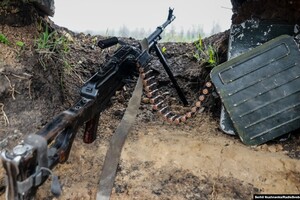The former military man points to a window of opportunity that will allow the Ukrainian army to defeat the Russian occupiers before they move to defensive positions.

Battle for Donbas, as well as the Russian war against Ukraine as a whole is approaching an important turning point. Ukraine's success in the battle for Kharkiv is very significant. The territories have been liberated, and the country's second largest city is outside Russian artillery. This is an important humanitarian and political achievement for Kyiv.
Also, thanks to the victory on this front, the morale and confidence of the Ukrainian army will be further strengthened. As in the north of the country, the Armed Forces have shown that they are able to defend, launch an offensive and liberate their land from Russia. They continue to act smarter and fight better than the Russian army, retired General of the Australian Armed Forces Mick Ryan wrote on his Twitter page.
He recalls that Russia has recently refocused its invasion of Ukraine, focusing on Donbass. However, so far she has not managed to achieve significant achievements there. Ukrainian forces almost completely stopped the enemy's movement. And the problems of the Russian army are not limited to the east. The whole invasion of Ukraine is nearing its climax. Ryan notes that this does not mean that Russia will soon be defeated. It is said that her army will soon lose the ability to conduct offensive operations.
Read also: The war in Ukraine marked the beginning of the end of Putin – the leader of the ruling party of Germany
Ryan suggests that theoretically Russia can gather forces for a final attempt to attack from Crimea. But this can be compared to the Ardennes operation of the Wehrmacht during World War II. Such an offensive will be tactically dangerous in the short term and strategically futile in the long run.
In Ukraine, after winning the battle for Kharkiv, there are several options available on how to proceed. Issues of available forces, logistics, air support and geography will be important. However, there are two key factors that need to be assessed: timing and operational limits. According to Ryan, the Ukrainian army has very competently planned its advance in the north-eastern direction near Kharkiv. Now you need to choose the right moment for a potentially broader counterattack in the east. This means balancing the constant depletion of Russian forces during the ongoing Ukrainian operations, and then attacking before the Russian army can establish a well-thought-out defensive position.
The area east of Kharkiv is vulnerable to the Ukrainian offensive. And not just because most Russian troops are deployed further south and east of the area. If we capture these territories, we can deprive Russia's offensive contingent of the necessary support. According to Ryan, this is an attractive option for Ukraine. Of course, Russian troops will be the defending party in this case. This means that it will have a certain advantage. However, it is always better to fight the enemy in an awkward place than where his forces are more concentrated. Attacking Russian rear areas, poorly protected places and logistics hubs or convoys, the Armed Forces forced the Russian army to withdraw from the north and northeast of Ukraine.
In the Donbass, Russia has much larger forces than those coming from the north. But any disruption to their supply chains will have a major impact on Russian offensive operations near Izyum. Ryan admits that Ukraine's success in such an operation is not guaranteed. After all, war is unpredictable. And the outcome of the counteroffensive may be very different. In conclusion, Ryan notes that Ukraine does not have much time to gather the necessary forces and resources to conduct a further counteroffensive in the east. The blow must be struck before Russia moves to the defensive position. If that happens, it will be harder to push back Russian forces.
Read also: The occupiers completely abandon their positions around Kharkiv – ISW
Reflecting on the “operational limits”, the retired general of the Australian Armed Forces explains that it is a question of how far the Armed Forces will go in their counterattack. In particular, will the offensive on Russian Belgorod begin? Ryan believes this is unlikely for a number of reasons. First, the Armed Forces have already proved that they are capable of defeating the Russian army. And they do not need to prove it again on Russian territory. Second, President Volodymyr Zelensky has gained global influence as the leader of a country defending itself against invasion. Crossing the Russian border will negatively affect this impact. Third, Russia has realized that conquering a foreign country is harder than defending one's own. The motivation of the occupying soldiers is very different from the motivation of the defenders. Ukrainians are smart enough to realize this. In addition, Ryan believes that the invasion of Russian territory will justify Putin's use of nuclear weapons. Because he will be able to present it as an “existential threat” to Russia.
See special topic: The occupiers fired on 11 settlements in the Donetsk region during the day: there are casualties Russian troops fired on civilians with small arms, aircraft, tanks, heavy artillery and mortars. How the cruiser “Moscow” sank: Ukrainian military published a recording of the last talks from the ship The occupier confirms two hits. “I deliberately helped the Russian Federation. I do not regret it. Glory to Russia!”: wanted to help the occupiers. There are five landing craft and two Russian cruise missiles in the Black Sea There is a threat of missile strikes on Ukraine. Kuleba: Germany has finally realized that Russian gas is the Kremlin's weapon at the heart of Europe EU discusses Russian gas embargo


